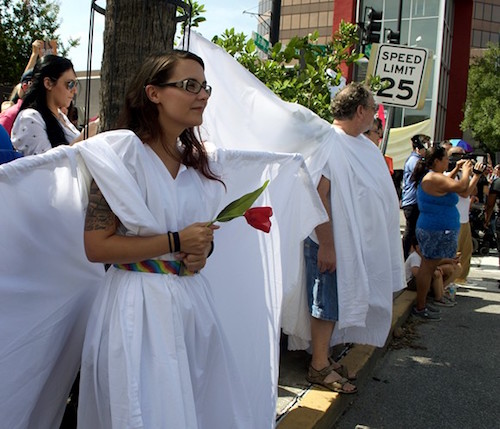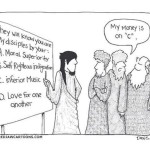We run our website the way we wished the whole internet worked: we provide high quality original content with no ads. We are funded solely by your direct support. Please consider supporting this project.

No Room for Judgment
In the light of the horrible violence in Orlando, and in response to the sickening judgmental statements that some Christian leaders have been making since the mass shooting about the victims who belong to the LGBTQ community, this is a time to remember our calling to revolt against all judgment as kingdom people. In the image above “Hundreds of demonstrators sang “Amazing Grace” to drown out the Westboro members’ infamous chants and cries as ‘guardian angels’ helped form a wall protecting the Cathedral Church of St. Luke with their large white wings.”* These “guardian angels” demonstrate beautifully the attitude the church should take towards oppressed groups.
The following is adapted from The Myth of A Christian Religion which challenges the notion that it is appropriate to cast judgment upon this or any other community.
Judgment is a big deal, even though we don’t think of it as such because it is so prevalent in society and even in the church. But it is a form of idolatry. Actually, it’s the most fundamental form of idolatry there is. It is a way of separating ourselves from other people and placing ourselves (or “our” group) above them. We’re contrasting ourselves favorably with others as a way of making ourselves feel more worthy by comparison.
Jesus makes it clear that judgment and life in the kingdom are antithetical to one another. It’s impossible for me to ascribe unsurpassable worth to a person or a group of people while judging them.
Every judgment we have toward others undermines the thing that we as the people of God are to offer them. Instead of agreeing with God that every person has unsurpassable worth, when we judge others we are disagreeing with him and detracting worth from others.
Jesus came to free us from judgment and to restore our capacity to love the way God loves. He says, “Do not judge, or you too will be judged. For in the same way you judge others, you will be judged, and with the measure you use, it will be measured to you” (Matt 7:2).
Jesus is teaching us that we can either play the judgment game or the grace game. If you don’t want to be judged, he says, don’t judge others. Extend to them the same gracious love that God has extended to you. But if you insist on playing the judgment game, then know that the judgment you give is the judgment you’ll get.
This teaching becomes even more radical when Jesus goes on to say, “Why do you look at the speck of sawdust in someone else’s eye and pay no attention to the plant in your own eye? How can you say, ‘Let me take the speck out of your eye,’ when all the time there is a plank in your own eye” (Matthew 7:3-4).
Jesus wasn’t saying this to people who were living in horrible sin. In fact, by the social and religious standards of the first century, the people Jesus was talking to would have been considered rather holy when compared to most others.
Jesus was challenging their addiction to getting life and self worth from their judgment of others. When we try to ascribe worth to ourselves at the expense of others—by judging them—we always minimize our own sins and faults and maximize the sins and faults of others.
To put it simply: We feed off the idolatrous illusion that, however imperfect we might be, at least we are not like those people.
Jesus calls us to revolt against this religious attitude. We are to regard our own sins—whatever they might be—as plank-sins while regarding other people’s sins—whatever they might be—as speck-sins. In our own eyes, we are to maximize our sins and faults and minimize the sins and faults of other. Whatever the faults we think we see in another, we’re to regard our sin as worse. With the apostle Paul, we’re to see ourselves as “the worst of sinners” (1 Timothy 1:15-16).
—Adapted from The Myth of Christian Religion, pages 49-54
Photo by Monivette Cordeiro via Orlando Weekly
*Quote from Sunday, June 19th article in Orlando Weekly
Category: General
Tags: Homosexuality, Judgment, LGBTQ, Love
Topics: Following Jesus
Related Reading

The Good Samaritan, Non-Violence & Eternal Life
Renaud Camus via Compfight An expert in the law asked Jesus what he had to do “to inherit eternal life” (See the story in Luke 10:25 and following). Jesus asked him what he thought the law said about this issue. The man responded, “’Love the Lord your God with all your heart and with all…

The Root of Broken Relationships
God’s goal for creation is for us to receive his perfect love in such a way that we all become prisms that reflect this love. However, you don’t have to look very far to notice that creation falls far short of this goal. Although you might be tempted to look around for someone to blame,…

A Brief Theology of God’s Love
The most profound truth of the Bible is that “God is love” (1 John 4:8, 16). This is the most fundamental thing to be said about God, for it encompasses everything else that can be said about God. Peter Kreft explains this passage it this way: Love is God’s essence. Nowhere else does Scripture express…

What God Requires
The reason we were created and what we are called to be is summed up in one word: love. The central defining truth of those who follow Jesus is that in Christ God ascribed unsurpassable worth to us, and thus the central defining mark of those who live in love is that they ascribe the…

